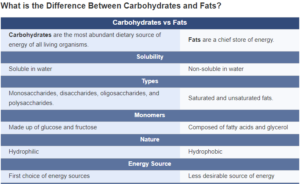Carbohydrates are soluble in water and are the most abundant source of dietary energy for all living organisms, while fats are insoluble in water but soluble in alcohol, ether, etc. Fats are also considered a main store of energy. Before going to learn the difference between fats and carbohydrates we learn in detail about carbohydrates and fats. Keep Reading …


Definition of carbohydrates
These are the most important macromolecules of all. Carbohydrate is an organic molecule that has an empirical formula as (CH 2 O) n, that is, carbon, hydrogen, and oxygen as the main components. But, some may contain nitrogen, phosphate, or sulfur as well.
Its function is very vital, since, in addition to providing energy to the body, carbohydrates have some other functions, such as serving as structural and protective elements of the cell walls of plants and bacteria, as an exoskeleton (hardcover) for arthropods, insects, etc. . lobster (exoskeleton is composed of chitin, which is a type of polysaccharide).
Also read: Types of carbohydrates
Definition of fats
Fats are said to be the simplest form of lipids that have carboxylic acids with the hydrocarbon side chain. The chemical name for fats and oils is ‘Triglycerols’, they are said to derive from hydrocarbons and fatty acid esters with glycerol. Fats and oils are not polymers, but small molecules that are insoluble in water but soluble in organic solvents such as alcohol, ether, etc. The main function of fats is to store energy.
Carbohydrates Vs Fats: Comparison table
| Basis for comparison | Carbohydrates | Fats |
|---|---|---|
| Composition | Carbohydrate is the organic molecule abundantly found on earth and, as its name implies, it is made up of carbon, hydrogen, and oxygen. | Fats also have carboxylic acids with hydrocarbon side chains. They are the simplest form of lipids. |
| Solubility | Carbohydrates are soluble in water. | Fats are insoluble in water but soluble in an inorganic solvent like alcohol, ethanol. |
| Sources | The main source of carbohydrates is table sugar, potatoes, bread, fruit juices, etc. | The oils in vegetables, seeds, nuts, and animal fats are the main source. |
| Where they are required | Carbohydrates are necessary to provide energy or fuel to the body immediately after food intake. | Fat is necessary for the growth of our body, mainly the task of fat is to store energy and absorb essentials. vitamins |
| Required quantity | You should take at least 45-65 percent carbohydrate of your calorie intake percentage. | Around 20-35 percent of the fat intake should be there. |
| Calories | Carbohydrates contain 4 calories/gram. | Fat contains 9 calories/gram. |
| The functions | After consumption of food, carbohydrates are converted into glucose, which is then used as energy for the metabolism process. | Fats help absorb vitamins such as A, D, E, K. |
| Fiber (indigestible) is a form of carbohydrate that helps maintain the level of glucose in the blood, the level of cholesterol, and mainly in the elimination of waste from the body. | It helps regulate the production of hormones, in the protection of cells, organs and helps maintain body temperature. |
Key Differences Between Fats and Carbohydrates
- Though both carbohydrate and fats are sources of energy, the key difference is that carbohydrate provides instant energy after intake of food, but fats help in the storage of energy, apart from this fats provide protection to vital organs, cell membranes, and also help in the regulation of hormones.
- Carbohydrates can be classified by the number of sugar units present in them, whereas Fats are classified by bonds, either single or double.
- Carbohydrates are precursors of many organic compounds like fats and amino acids; Fats serve as a source of fat-soluble vitamins (A, D, E, and K).
- Carbohydrates in the form of glycoproteins and glycolipids help in cell growth, adhesion, and other functions. Fats also help in maintaining proper body temperature.
Related Articles
Related Post
Recent Posts
Is energy quantized in classical physics?
No, according to classical wave theory the emission of electromagnetic radiations from the surface is…
Types of laser
Basically, there are four types of laser which includes: Gas Lasers Solid State lasers Liquid…
Ultrasound frequency range
What is ultrasonics? The study and application of mechanical vibrations with frequencies beyond the limits…
Electromagnetic Energy: What are some examples of it?
Electromagnetic energy definition Electromagnetic energy is the amount of energy stored in a region of…
Fundamental units and Derived Units with Examples
The Main Difference between fundamental Units and Base units is that Units that Express base…
Newton’s First law of Motion Examples in Our Daily Life
Newton's first law of motion states that " A body continues its state of rest…